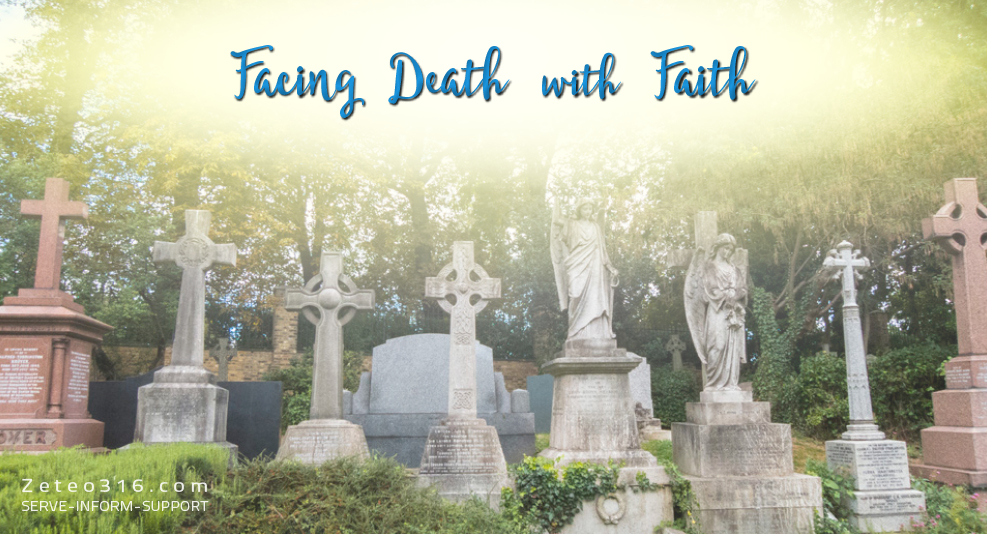In contemplating the intrinsic nature of human existence, one encounters the perennial question: how should individuals grapple with the inevitability of death? What if embracing this reality could serve as a catalyst for profound transformation? Through the lens of Bahá’í teachings, the phenomenon of death is not merely an end, but rather a transition into a new dimension of existence. This article endeavors to elucidate the Bahá’í perspective on facing death with unwavering faith, inviting readers to explore both the doctrinal foundations and practical implications of this philosophy.
At the heart of Bahá’í teachings lies a reverence for the oneness of humanity and the interconnectedness of all spiritual truths. Death, viewed through this prism, is the gateway to the next stage of existence. Bahá’u’lláh, the founder of the Bahá’í Faith, posits that the soul is eternal and progresses through various realms after physical demise. This continuity challenges the conventional narrative of life ending with death, offering a perspective that instills hope and purpose.
The Bahá’í writings emphasize the importance of interpreting death not as a tragic conclusion, but as a transformative passage. ‘Abdu’l-Bahá, the son of Bahá’u’lláh, articulated that the soul ascends to a realm commensurate with its deeds and spiritual development. Therefore, the moral and ethical choices made during one’s lifetime become pivotal in determining the posthumous journey of the soul. This premise invites individuals to cultivate virtues and engage in acts of service, fostering a life imbued with meaning.
When faced with the specter of mortality, it is natural for individuals to experience fear and anxiety. Yet, Bahá’í teachings encourage a robust confidence in the loving nature of God. The realization that the Creator has designed a purposeful continuum of existence provides solace. The prayerful reflection on divine attributes nurtures a steadfast faith that transcends the traumas associated with loss. The Bahá’í perspective cultivates an understanding that death is a stepping stone to an everlasting journey, thus easing existential dread.
In engaging with death, the Bahá’í Faith also advocates for a balanced approach to grieving. While sorrow upon the loss of a loved one is expected and valid, individuals are encouraged to seek solace in community support and spiritual guidance. The communal aspects of the Bahá’í community play an indispensable role in alleviating the isolation often experienced during mourning. Rituals, prayers, and gatherings serve as therapeutic conduits to navigate grief, facilitating a process of healing that honors the memory of the departed.
The imperative to live a life of purpose, characterized by compassion and altruism, becomes even more pronounced with the acknowledgment of mortality. Bahá’í teachings prompt individuals to reflect on their life’s mission in the present, reinforcing the idea that the time to contribute positively to humanity’s collective well-being is limited. The awareness of temporal existence can incite an urgency to fulfill one’s spiritual and social responsibilities, embodying the principle that actions taken in this life resonate in the realms beyond.
Moreover, the Bahá’í understanding of death is interwoven with the concept of unity. In times of loss, it becomes paramount to remember the shared humanity that binds individuals together. The perspective of oneness extends beyond the borders of life and death, inviting individuals to cultivate empathy and support for others who grieve. This interconnectedness serves as a vital reminder that, although one may depart from their physical form, their essence perpetuates through the connections forged in life.
While Bahá’í teachings provide a comprehensive framework for confronting death, they also provoke a challenge: how does one actively nurture a faith steadfast enough to withstand the trials of life and its eventual conclusion? The answer lies in the integration of spiritual practice into daily life. By establishing a regimen of prayer, meditation, and study of the sacred texts, believers can fortify their spiritual resilience, equipping themselves to face death with a sense of acceptance and hope.
The Bahá’í writings assert that the soul’s development is contingent upon its closeness to God. Engaging with the divine through regular spiritual practices cultivates a profound connection that fosters courage in the face of mortality. Additionally, the act of serving others—be it through volunteerism, teaching, or simply offering kindness—further enhances this relationship, creating a virtuous cycle of giving and growing spiritually.
Ultimately, the Bahá’í perspective on death invites a reevaluation of life’s priorities. It embodies an encouragement to transcend fear and embrace the unknown with faith. In recognizing that death is an integral aspect of the human experience, individuals can cultivate a robust appreciation for life itself, prompting them to live intentionally and purposefully.
In conclusion, the Bahá’í teachings furnish profound insights that assist individuals in facing death with faith. By promoting an understanding of the soul’s eternal journey, the encouragement to live meaningfully, and the facilitation of communal support, these principles guide followers toward an acceptance of mortality that is imbued with hope. In pondering the inevitable end of life, the Bahá’í Faith ultimately fosters a harmonious worldview where death is viewed not with fear, but with faith and love, laying the foundation for a life well-lived.
